Principles of Health and Social Care Practices Evaluation Report
VerifiedAdded on 2020/01/23
|14
|4791
|218
Report
AI Summary
This report comprehensively evaluates the principles that guide health and social care practices. It begins with an introduction to the core principles, emphasizing patient rights and the importance of adherence to ensure quality service delivery. The report then delves into specific tasks, including the application of support principles for patients and their families, procedures for protecting patients and colleagues, and the benefits of a person-centered approach. It also explores potential ethical dilemmas and conflicts that may arise in care provision. The report further analyzes the implementation of relevant legislation, policies, and practice codes, examining their impact on organizational procedures. Finally, it explains various theories affecting health and social care practices, such as psychoanalytical, cognitive, and socio-biological theories, providing a holistic overview of the subject matter. The report is a student's contribution to Desklib, a platform offering AI-based study tools for students.
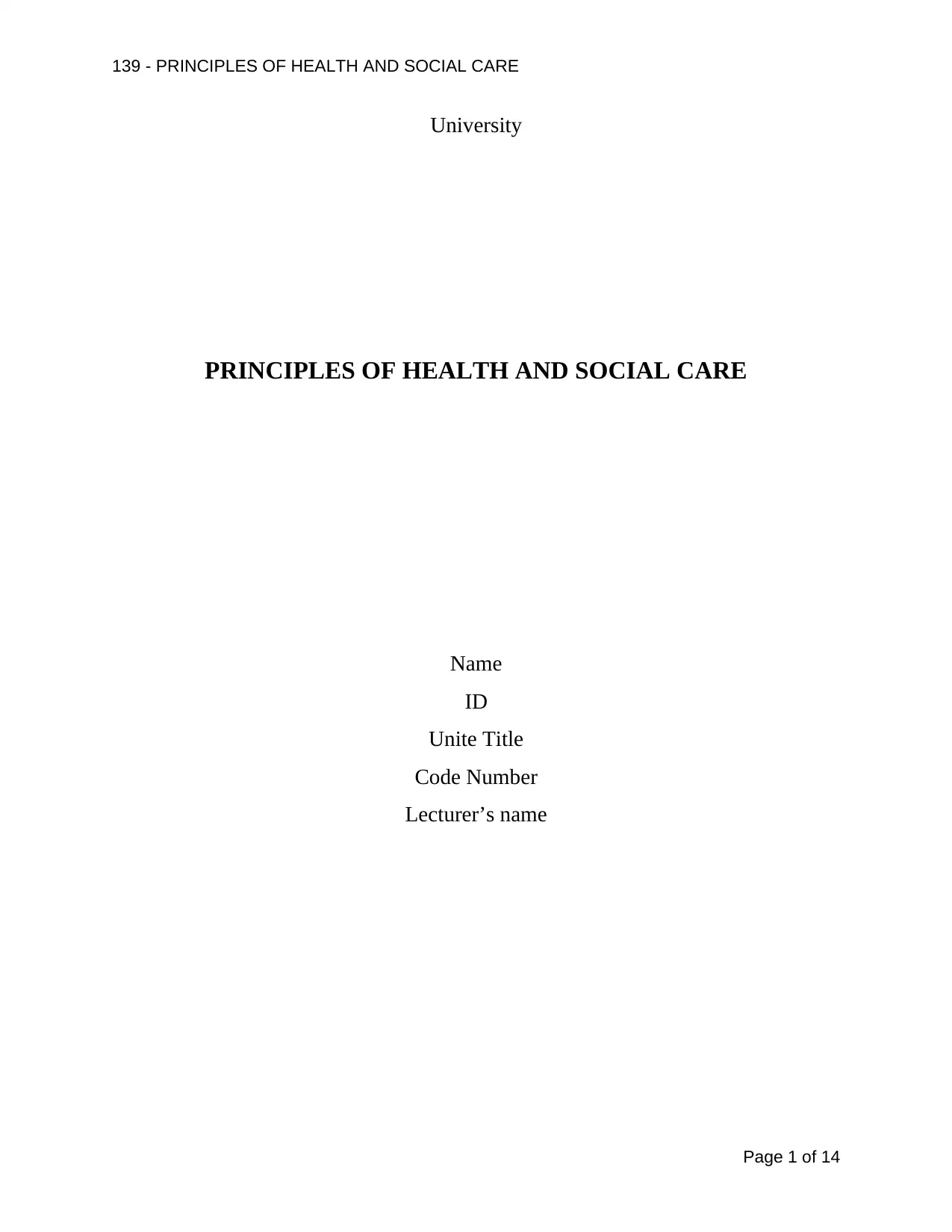
139 - PRINCIPLES OF HEALTH AND SOCIAL CARE
University
PRINCIPLES OF HEALTH AND SOCIAL CARE
Name
ID
Unite Title
Code Number
Lecturer’s name
Page 1 of 14
University
PRINCIPLES OF HEALTH AND SOCIAL CARE
Name
ID
Unite Title
Code Number
Lecturer’s name
Page 1 of 14
Paraphrase This Document
Need a fresh take? Get an instant paraphrase of this document with our AI Paraphraser
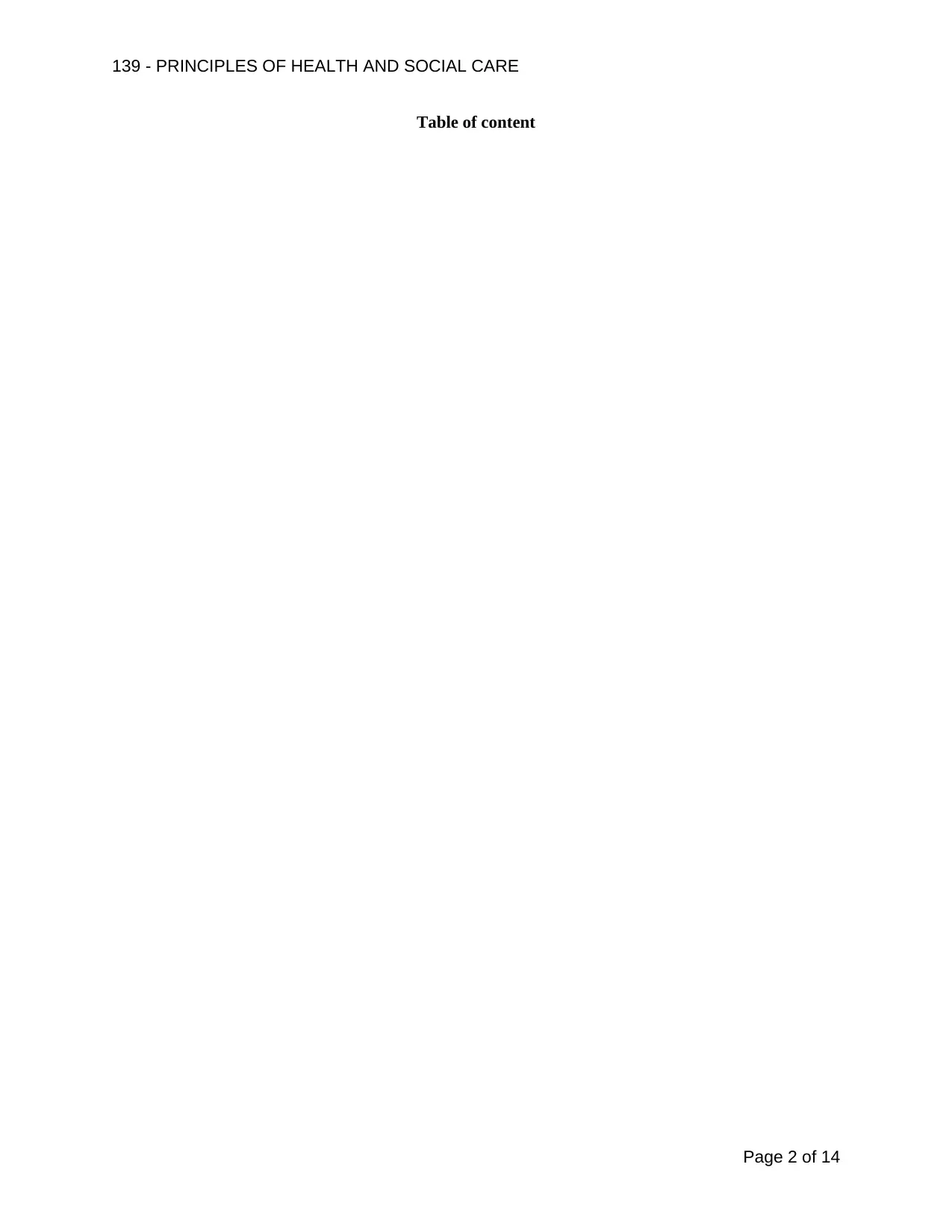
139 - PRINCIPLES OF HEALTH AND SOCIAL CARE
Table of content
Page 2 of 14
Table of content
Page 2 of 14
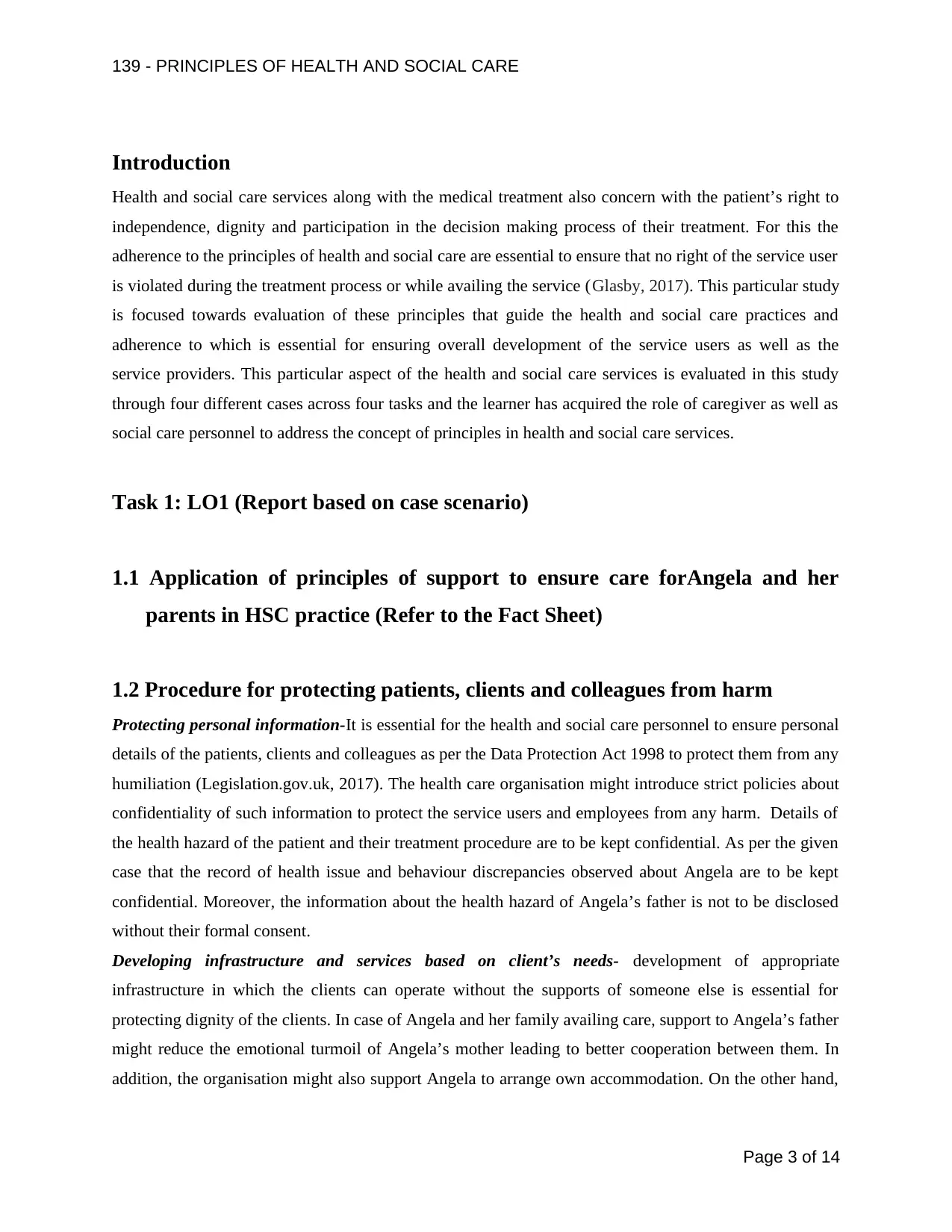
139 - PRINCIPLES OF HEALTH AND SOCIAL CARE
Introduction
Health and social care services along with the medical treatment also concern with the patient’s right to
independence, dignity and participation in the decision making process of their treatment. For this the
adherence to the principles of health and social care are essential to ensure that no right of the service user
is violated during the treatment process or while availing the service (Glasby, 2017). This particular study
is focused towards evaluation of these principles that guide the health and social care practices and
adherence to which is essential for ensuring overall development of the service users as well as the
service providers. This particular aspect of the health and social care services is evaluated in this study
through four different cases across four tasks and the learner has acquired the role of caregiver as well as
social care personnel to address the concept of principles in health and social care services.
Task 1: LO1 (Report based on case scenario)
1.1 Application of principles of support to ensure care forAngela and her
parents in HSC practice (Refer to the Fact Sheet)
1.2 Procedure for protecting patients, clients and colleagues from harm
Protecting personal information-It is essential for the health and social care personnel to ensure personal
details of the patients, clients and colleagues as per the Data Protection Act 1998 to protect them from any
humiliation (Legislation.gov.uk, 2017). The health care organisation might introduce strict policies about
confidentiality of such information to protect the service users and employees from any harm. Details of
the health hazard of the patient and their treatment procedure are to be kept confidential. As per the given
case that the record of health issue and behaviour discrepancies observed about Angela are to be kept
confidential. Moreover, the information about the health hazard of Angela’s father is not to be disclosed
without their formal consent.
Developing infrastructure and services based on client’s needs- development of appropriate
infrastructure in which the clients can operate without the supports of someone else is essential for
protecting dignity of the clients. In case of Angela and her family availing care, support to Angela’s father
might reduce the emotional turmoil of Angela’s mother leading to better cooperation between them. In
addition, the organisation might also support Angela to arrange own accommodation. On the other hand,
Page 3 of 14
Introduction
Health and social care services along with the medical treatment also concern with the patient’s right to
independence, dignity and participation in the decision making process of their treatment. For this the
adherence to the principles of health and social care are essential to ensure that no right of the service user
is violated during the treatment process or while availing the service (Glasby, 2017). This particular study
is focused towards evaluation of these principles that guide the health and social care practices and
adherence to which is essential for ensuring overall development of the service users as well as the
service providers. This particular aspect of the health and social care services is evaluated in this study
through four different cases across four tasks and the learner has acquired the role of caregiver as well as
social care personnel to address the concept of principles in health and social care services.
Task 1: LO1 (Report based on case scenario)
1.1 Application of principles of support to ensure care forAngela and her
parents in HSC practice (Refer to the Fact Sheet)
1.2 Procedure for protecting patients, clients and colleagues from harm
Protecting personal information-It is essential for the health and social care personnel to ensure personal
details of the patients, clients and colleagues as per the Data Protection Act 1998 to protect them from any
humiliation (Legislation.gov.uk, 2017). The health care organisation might introduce strict policies about
confidentiality of such information to protect the service users and employees from any harm. Details of
the health hazard of the patient and their treatment procedure are to be kept confidential. As per the given
case that the record of health issue and behaviour discrepancies observed about Angela are to be kept
confidential. Moreover, the information about the health hazard of Angela’s father is not to be disclosed
without their formal consent.
Developing infrastructure and services based on client’s needs- development of appropriate
infrastructure in which the clients can operate without the supports of someone else is essential for
protecting dignity of the clients. In case of Angela and her family availing care, support to Angela’s father
might reduce the emotional turmoil of Angela’s mother leading to better cooperation between them. In
addition, the organisation might also support Angela to arrange own accommodation. On the other hand,
Page 3 of 14
⊘ This is a preview!⊘
Do you want full access?
Subscribe today to unlock all pages.

Trusted by 1+ million students worldwide
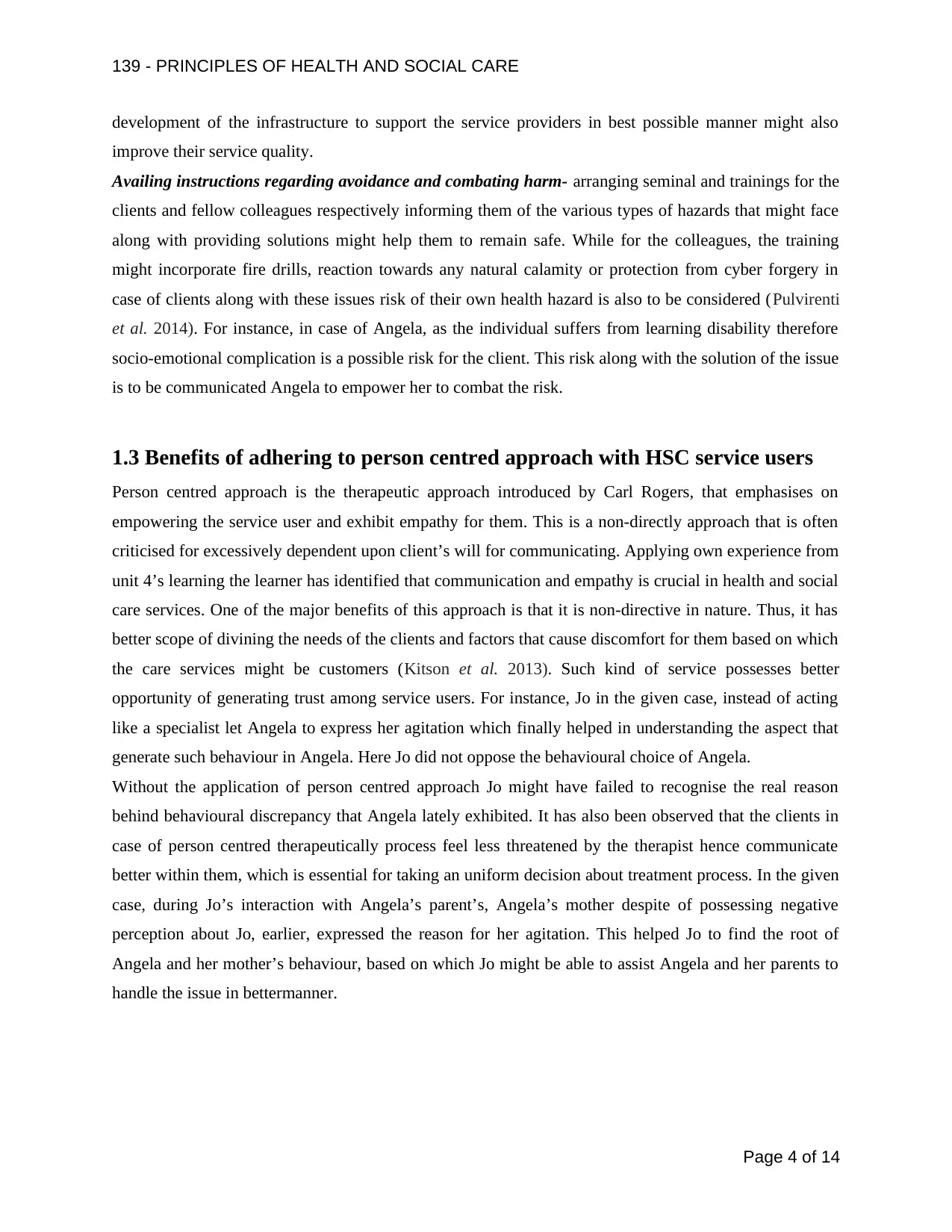
139 - PRINCIPLES OF HEALTH AND SOCIAL CARE
development of the infrastructure to support the service providers in best possible manner might also
improve their service quality.
Availing instructions regarding avoidance and combating harm- arranging seminal and trainings for the
clients and fellow colleagues respectively informing them of the various types of hazards that might face
along with providing solutions might help them to remain safe. While for the colleagues, the training
might incorporate fire drills, reaction towards any natural calamity or protection from cyber forgery in
case of clients along with these issues risk of their own health hazard is also to be considered (Pulvirenti
et al. 2014). For instance, in case of Angela, as the individual suffers from learning disability therefore
socio-emotional complication is a possible risk for the client. This risk along with the solution of the issue
is to be communicated Angela to empower her to combat the risk.
1.3 Benefits of adhering to person centred approach with HSC service users
Person centred approach is the therapeutic approach introduced by Carl Rogers, that emphasises on
empowering the service user and exhibit empathy for them. This is a non-directly approach that is often
criticised for excessively dependent upon client’s will for communicating. Applying own experience from
unit 4’s learning the learner has identified that communication and empathy is crucial in health and social
care services. One of the major benefits of this approach is that it is non-directive in nature. Thus, it has
better scope of divining the needs of the clients and factors that cause discomfort for them based on which
the care services might be customers (Kitson et al. 2013). Such kind of service possesses better
opportunity of generating trust among service users. For instance, Jo in the given case, instead of acting
like a specialist let Angela to express her agitation which finally helped in understanding the aspect that
generate such behaviour in Angela. Here Jo did not oppose the behavioural choice of Angela.
Without the application of person centred approach Jo might have failed to recognise the real reason
behind behavioural discrepancy that Angela lately exhibited. It has also been observed that the clients in
case of person centred therapeutically process feel less threatened by the therapist hence communicate
better within them, which is essential for taking an uniform decision about treatment process. In the given
case, during Jo’s interaction with Angela’s parent’s, Angela’s mother despite of possessing negative
perception about Jo, earlier, expressed the reason for her agitation. This helped Jo to find the root of
Angela and her mother’s behaviour, based on which Jo might be able to assist Angela and her parents to
handle the issue in bettermanner.
Page 4 of 14
development of the infrastructure to support the service providers in best possible manner might also
improve their service quality.
Availing instructions regarding avoidance and combating harm- arranging seminal and trainings for the
clients and fellow colleagues respectively informing them of the various types of hazards that might face
along with providing solutions might help them to remain safe. While for the colleagues, the training
might incorporate fire drills, reaction towards any natural calamity or protection from cyber forgery in
case of clients along with these issues risk of their own health hazard is also to be considered (Pulvirenti
et al. 2014). For instance, in case of Angela, as the individual suffers from learning disability therefore
socio-emotional complication is a possible risk for the client. This risk along with the solution of the issue
is to be communicated Angela to empower her to combat the risk.
1.3 Benefits of adhering to person centred approach with HSC service users
Person centred approach is the therapeutic approach introduced by Carl Rogers, that emphasises on
empowering the service user and exhibit empathy for them. This is a non-directly approach that is often
criticised for excessively dependent upon client’s will for communicating. Applying own experience from
unit 4’s learning the learner has identified that communication and empathy is crucial in health and social
care services. One of the major benefits of this approach is that it is non-directive in nature. Thus, it has
better scope of divining the needs of the clients and factors that cause discomfort for them based on which
the care services might be customers (Kitson et al. 2013). Such kind of service possesses better
opportunity of generating trust among service users. For instance, Jo in the given case, instead of acting
like a specialist let Angela to express her agitation which finally helped in understanding the aspect that
generate such behaviour in Angela. Here Jo did not oppose the behavioural choice of Angela.
Without the application of person centred approach Jo might have failed to recognise the real reason
behind behavioural discrepancy that Angela lately exhibited. It has also been observed that the clients in
case of person centred therapeutically process feel less threatened by the therapist hence communicate
better within them, which is essential for taking an uniform decision about treatment process. In the given
case, during Jo’s interaction with Angela’s parent’s, Angela’s mother despite of possessing negative
perception about Jo, earlier, expressed the reason for her agitation. This helped Jo to find the root of
Angela and her mother’s behaviour, based on which Jo might be able to assist Angela and her parents to
handle the issue in bettermanner.
Page 4 of 14
Paraphrase This Document
Need a fresh take? Get an instant paraphrase of this document with our AI Paraphraser
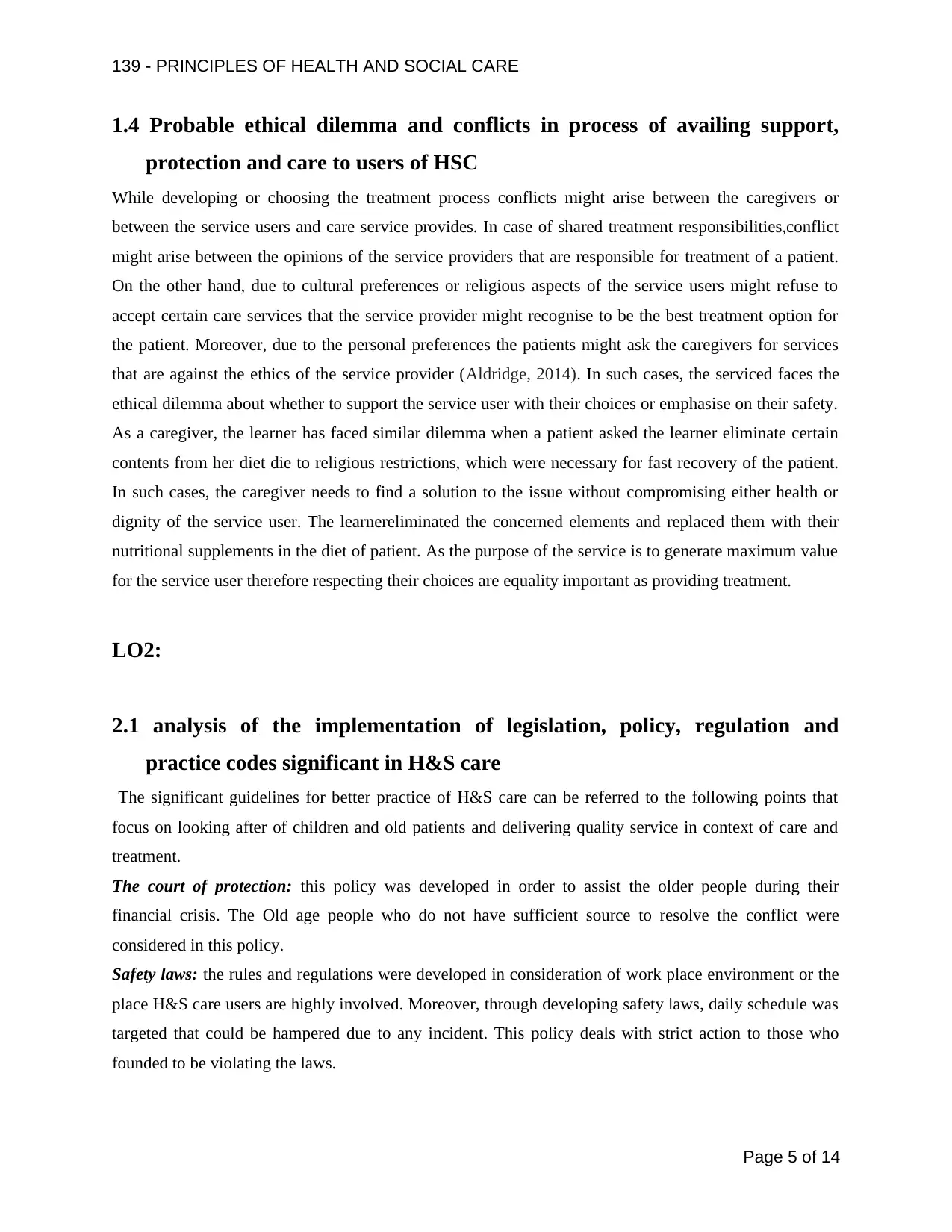
139 - PRINCIPLES OF HEALTH AND SOCIAL CARE
1.4 Probable ethical dilemma and conflicts in process of availing support,
protection and care to users of HSC
While developing or choosing the treatment process conflicts might arise between the caregivers or
between the service users and care service provides. In case of shared treatment responsibilities,conflict
might arise between the opinions of the service providers that are responsible for treatment of a patient.
On the other hand, due to cultural preferences or religious aspects of the service users might refuse to
accept certain care services that the service provider might recognise to be the best treatment option for
the patient. Moreover, due to the personal preferences the patients might ask the caregivers for services
that are against the ethics of the service provider (Aldridge, 2014). In such cases, the serviced faces the
ethical dilemma about whether to support the service user with their choices or emphasise on their safety.
As a caregiver, the learner has faced similar dilemma when a patient asked the learner eliminate certain
contents from her diet die to religious restrictions, which were necessary for fast recovery of the patient.
In such cases, the caregiver needs to find a solution to the issue without compromising either health or
dignity of the service user. The learnereliminated the concerned elements and replaced them with their
nutritional supplements in the diet of patient. As the purpose of the service is to generate maximum value
for the service user therefore respecting their choices are equality important as providing treatment.
LO2:
2.1 analysis of the implementation of legislation, policy, regulation and
practice codes significant in H&S care
The significant guidelines for better practice of H&S care can be referred to the following points that
focus on looking after of children and old patients and delivering quality service in context of care and
treatment.
The court of protection: this policy was developed in order to assist the older people during their
financial crisis. The Old age people who do not have sufficient source to resolve the conflict were
considered in this policy.
Safety laws: the rules and regulations were developed in consideration of work place environment or the
place H&S care users are highly involved. Moreover, through developing safety laws, daily schedule was
targeted that could be hampered due to any incident. This policy deals with strict action to those who
founded to be violating the laws.
Page 5 of 14
1.4 Probable ethical dilemma and conflicts in process of availing support,
protection and care to users of HSC
While developing or choosing the treatment process conflicts might arise between the caregivers or
between the service users and care service provides. In case of shared treatment responsibilities,conflict
might arise between the opinions of the service providers that are responsible for treatment of a patient.
On the other hand, due to cultural preferences or religious aspects of the service users might refuse to
accept certain care services that the service provider might recognise to be the best treatment option for
the patient. Moreover, due to the personal preferences the patients might ask the caregivers for services
that are against the ethics of the service provider (Aldridge, 2014). In such cases, the serviced faces the
ethical dilemma about whether to support the service user with their choices or emphasise on their safety.
As a caregiver, the learner has faced similar dilemma when a patient asked the learner eliminate certain
contents from her diet die to religious restrictions, which were necessary for fast recovery of the patient.
In such cases, the caregiver needs to find a solution to the issue without compromising either health or
dignity of the service user. The learnereliminated the concerned elements and replaced them with their
nutritional supplements in the diet of patient. As the purpose of the service is to generate maximum value
for the service user therefore respecting their choices are equality important as providing treatment.
LO2:
2.1 analysis of the implementation of legislation, policy, regulation and
practice codes significant in H&S care
The significant guidelines for better practice of H&S care can be referred to the following points that
focus on looking after of children and old patients and delivering quality service in context of care and
treatment.
The court of protection: this policy was developed in order to assist the older people during their
financial crisis. The Old age people who do not have sufficient source to resolve the conflict were
considered in this policy.
Safety laws: the rules and regulations were developed in consideration of work place environment or the
place H&S care users are highly involved. Moreover, through developing safety laws, daily schedule was
targeted that could be hampered due to any incident. This policy deals with strict action to those who
founded to be violating the laws.
Page 5 of 14
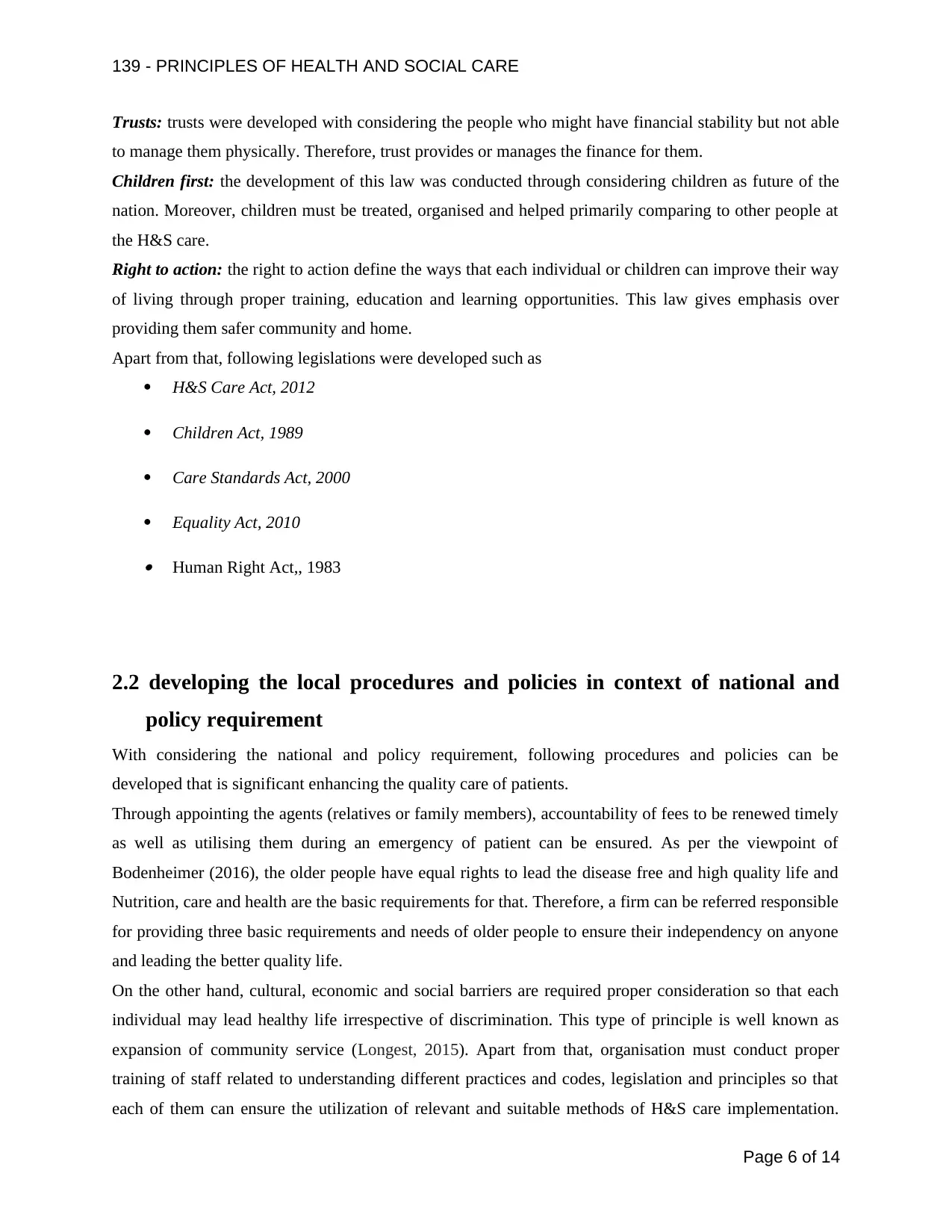
139 - PRINCIPLES OF HEALTH AND SOCIAL CARE
Trusts: trusts were developed with considering the people who might have financial stability but not able
to manage them physically. Therefore, trust provides or manages the finance for them.
Children first: the development of this law was conducted through considering children as future of the
nation. Moreover, children must be treated, organised and helped primarily comparing to other people at
the H&S care.
Right to action: the right to action define the ways that each individual or children can improve their way
of living through proper training, education and learning opportunities. This law gives emphasis over
providing them safer community and home.
Apart from that, following legislations were developed such as
H&S Care Act, 2012
Children Act, 1989
Care Standards Act, 2000
Equality Act, 2010 Human Right Act,, 1983
2.2 developing the local procedures and policies in context of national and
policy requirement
With considering the national and policy requirement, following procedures and policies can be
developed that is significant enhancing the quality care of patients.
Through appointing the agents (relatives or family members), accountability of fees to be renewed timely
as well as utilising them during an emergency of patient can be ensured. As per the viewpoint of
Bodenheimer (2016), the older people have equal rights to lead the disease free and high quality life and
Nutrition, care and health are the basic requirements for that. Therefore, a firm can be referred responsible
for providing three basic requirements and needs of older people to ensure their independency on anyone
and leading the better quality life.
On the other hand, cultural, economic and social barriers are required proper consideration so that each
individual may lead healthy life irrespective of discrimination. This type of principle is well known as
expansion of community service (Longest, 2015). Apart from that, organisation must conduct proper
training of staff related to understanding different practices and codes, legislation and principles so that
each of them can ensure the utilization of relevant and suitable methods of H&S care implementation.
Page 6 of 14
Trusts: trusts were developed with considering the people who might have financial stability but not able
to manage them physically. Therefore, trust provides or manages the finance for them.
Children first: the development of this law was conducted through considering children as future of the
nation. Moreover, children must be treated, organised and helped primarily comparing to other people at
the H&S care.
Right to action: the right to action define the ways that each individual or children can improve their way
of living through proper training, education and learning opportunities. This law gives emphasis over
providing them safer community and home.
Apart from that, following legislations were developed such as
H&S Care Act, 2012
Children Act, 1989
Care Standards Act, 2000
Equality Act, 2010 Human Right Act,, 1983
2.2 developing the local procedures and policies in context of national and
policy requirement
With considering the national and policy requirement, following procedures and policies can be
developed that is significant enhancing the quality care of patients.
Through appointing the agents (relatives or family members), accountability of fees to be renewed timely
as well as utilising them during an emergency of patient can be ensured. As per the viewpoint of
Bodenheimer (2016), the older people have equal rights to lead the disease free and high quality life and
Nutrition, care and health are the basic requirements for that. Therefore, a firm can be referred responsible
for providing three basic requirements and needs of older people to ensure their independency on anyone
and leading the better quality life.
On the other hand, cultural, economic and social barriers are required proper consideration so that each
individual may lead healthy life irrespective of discrimination. This type of principle is well known as
expansion of community service (Longest, 2015). Apart from that, organisation must conduct proper
training of staff related to understanding different practices and codes, legislation and principles so that
each of them can ensure the utilization of relevant and suitable methods of H&S care implementation.
Page 6 of 14
⊘ This is a preview!⊘
Do you want full access?
Subscribe today to unlock all pages.

Trusted by 1+ million students worldwide
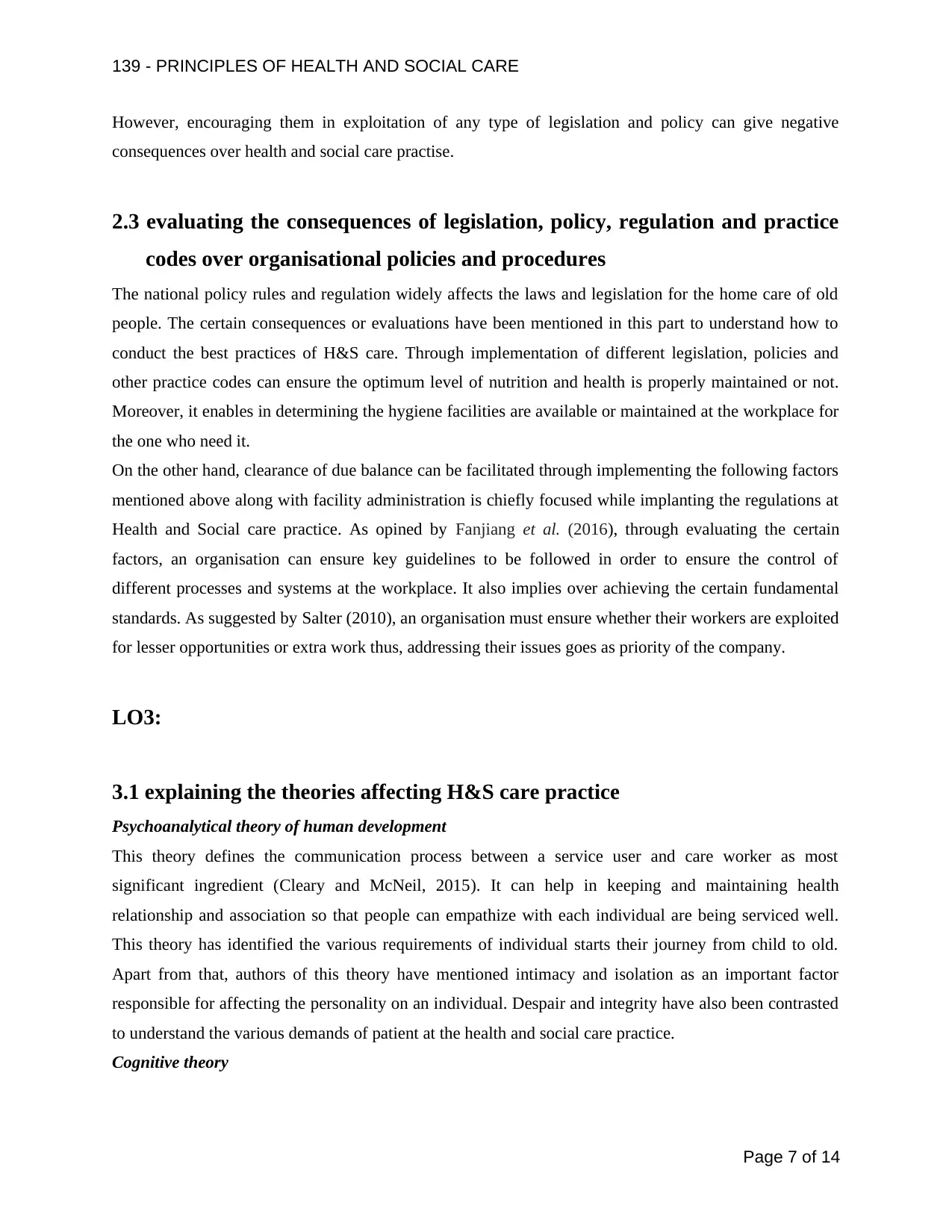
139 - PRINCIPLES OF HEALTH AND SOCIAL CARE
However, encouraging them in exploitation of any type of legislation and policy can give negative
consequences over health and social care practise.
2.3 evaluating the consequences of legislation, policy, regulation and practice
codes over organisational policies and procedures
The national policy rules and regulation widely affects the laws and legislation for the home care of old
people. The certain consequences or evaluations have been mentioned in this part to understand how to
conduct the best practices of H&S care. Through implementation of different legislation, policies and
other practice codes can ensure the optimum level of nutrition and health is properly maintained or not.
Moreover, it enables in determining the hygiene facilities are available or maintained at the workplace for
the one who need it.
On the other hand, clearance of due balance can be facilitated through implementing the following factors
mentioned above along with facility administration is chiefly focused while implanting the regulations at
Health and Social care practice. As opined by Fanjiang et al. (2016), through evaluating the certain
factors, an organisation can ensure key guidelines to be followed in order to ensure the control of
different processes and systems at the workplace. It also implies over achieving the certain fundamental
standards. As suggested by Salter (2010), an organisation must ensure whether their workers are exploited
for lesser opportunities or extra work thus, addressing their issues goes as priority of the company.
LO3:
3.1 explaining the theories affecting H&S care practice
Psychoanalytical theory of human development
This theory defines the communication process between a service user and care worker as most
significant ingredient (Cleary and McNeil, 2015). It can help in keeping and maintaining health
relationship and association so that people can empathize with each individual are being serviced well.
This theory has identified the various requirements of individual starts their journey from child to old.
Apart from that, authors of this theory have mentioned intimacy and isolation as an important factor
responsible for affecting the personality on an individual. Despair and integrity have also been contrasted
to understand the various demands of patient at the health and social care practice.
Cognitive theory
Page 7 of 14
However, encouraging them in exploitation of any type of legislation and policy can give negative
consequences over health and social care practise.
2.3 evaluating the consequences of legislation, policy, regulation and practice
codes over organisational policies and procedures
The national policy rules and regulation widely affects the laws and legislation for the home care of old
people. The certain consequences or evaluations have been mentioned in this part to understand how to
conduct the best practices of H&S care. Through implementation of different legislation, policies and
other practice codes can ensure the optimum level of nutrition and health is properly maintained or not.
Moreover, it enables in determining the hygiene facilities are available or maintained at the workplace for
the one who need it.
On the other hand, clearance of due balance can be facilitated through implementing the following factors
mentioned above along with facility administration is chiefly focused while implanting the regulations at
Health and Social care practice. As opined by Fanjiang et al. (2016), through evaluating the certain
factors, an organisation can ensure key guidelines to be followed in order to ensure the control of
different processes and systems at the workplace. It also implies over achieving the certain fundamental
standards. As suggested by Salter (2010), an organisation must ensure whether their workers are exploited
for lesser opportunities or extra work thus, addressing their issues goes as priority of the company.
LO3:
3.1 explaining the theories affecting H&S care practice
Psychoanalytical theory of human development
This theory defines the communication process between a service user and care worker as most
significant ingredient (Cleary and McNeil, 2015). It can help in keeping and maintaining health
relationship and association so that people can empathize with each individual are being serviced well.
This theory has identified the various requirements of individual starts their journey from child to old.
Apart from that, authors of this theory have mentioned intimacy and isolation as an important factor
responsible for affecting the personality on an individual. Despair and integrity have also been contrasted
to understand the various demands of patient at the health and social care practice.
Cognitive theory
Page 7 of 14
Paraphrase This Document
Need a fresh take? Get an instant paraphrase of this document with our AI Paraphraser
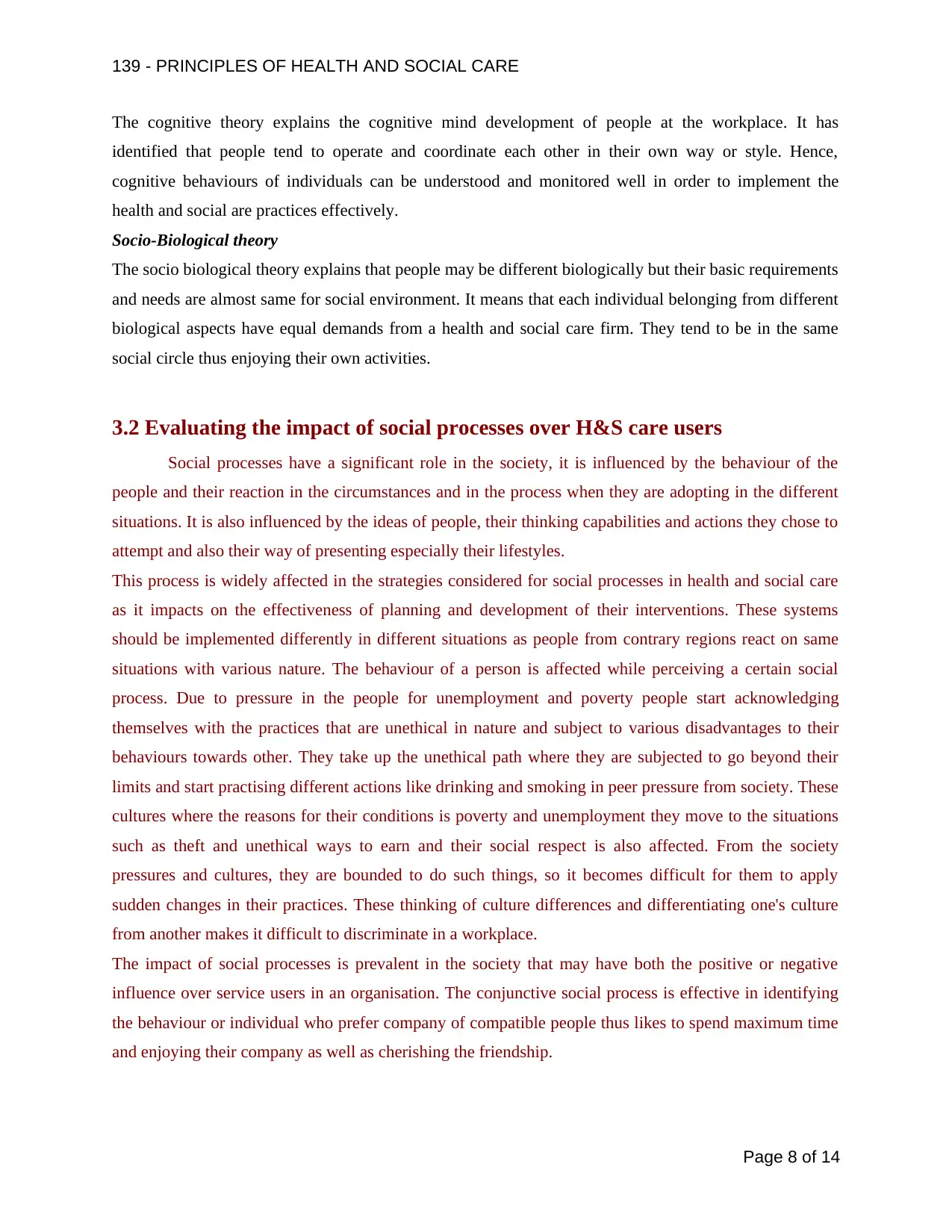
139 - PRINCIPLES OF HEALTH AND SOCIAL CARE
The cognitive theory explains the cognitive mind development of people at the workplace. It has
identified that people tend to operate and coordinate each other in their own way or style. Hence,
cognitive behaviours of individuals can be understood and monitored well in order to implement the
health and social are practices effectively.
Socio-Biological theory
The socio biological theory explains that people may be different biologically but their basic requirements
and needs are almost same for social environment. It means that each individual belonging from different
biological aspects have equal demands from a health and social care firm. They tend to be in the same
social circle thus enjoying their own activities.
3.2 Evaluating the impact of social processes over H&S care users
Social processes have a significant role in the society, it is influenced by the behaviour of the
people and their reaction in the circumstances and in the process when they are adopting in the different
situations. It is also influenced by the ideas of people, their thinking capabilities and actions they chose to
attempt and also their way of presenting especially their lifestyles.
This process is widely affected in the strategies considered for social processes in health and social care
as it impacts on the effectiveness of planning and development of their interventions. These systems
should be implemented differently in different situations as people from contrary regions react on same
situations with various nature. The behaviour of a person is affected while perceiving a certain social
process. Due to pressure in the people for unemployment and poverty people start acknowledging
themselves with the practices that are unethical in nature and subject to various disadvantages to their
behaviours towards other. They take up the unethical path where they are subjected to go beyond their
limits and start practising different actions like drinking and smoking in peer pressure from society. These
cultures where the reasons for their conditions is poverty and unemployment they move to the situations
such as theft and unethical ways to earn and their social respect is also affected. From the society
pressures and cultures, they are bounded to do such things, so it becomes difficult for them to apply
sudden changes in their practices. These thinking of culture differences and differentiating one's culture
from another makes it difficult to discriminate in a workplace.
The impact of social processes is prevalent in the society that may have both the positive or negative
influence over service users in an organisation. The conjunctive social process is effective in identifying
the behaviour or individual who prefer company of compatible people thus likes to spend maximum time
and enjoying their company as well as cherishing the friendship.
Page 8 of 14
The cognitive theory explains the cognitive mind development of people at the workplace. It has
identified that people tend to operate and coordinate each other in their own way or style. Hence,
cognitive behaviours of individuals can be understood and monitored well in order to implement the
health and social are practices effectively.
Socio-Biological theory
The socio biological theory explains that people may be different biologically but their basic requirements
and needs are almost same for social environment. It means that each individual belonging from different
biological aspects have equal demands from a health and social care firm. They tend to be in the same
social circle thus enjoying their own activities.
3.2 Evaluating the impact of social processes over H&S care users
Social processes have a significant role in the society, it is influenced by the behaviour of the
people and their reaction in the circumstances and in the process when they are adopting in the different
situations. It is also influenced by the ideas of people, their thinking capabilities and actions they chose to
attempt and also their way of presenting especially their lifestyles.
This process is widely affected in the strategies considered for social processes in health and social care
as it impacts on the effectiveness of planning and development of their interventions. These systems
should be implemented differently in different situations as people from contrary regions react on same
situations with various nature. The behaviour of a person is affected while perceiving a certain social
process. Due to pressure in the people for unemployment and poverty people start acknowledging
themselves with the practices that are unethical in nature and subject to various disadvantages to their
behaviours towards other. They take up the unethical path where they are subjected to go beyond their
limits and start practising different actions like drinking and smoking in peer pressure from society. These
cultures where the reasons for their conditions is poverty and unemployment they move to the situations
such as theft and unethical ways to earn and their social respect is also affected. From the society
pressures and cultures, they are bounded to do such things, so it becomes difficult for them to apply
sudden changes in their practices. These thinking of culture differences and differentiating one's culture
from another makes it difficult to discriminate in a workplace.
The impact of social processes is prevalent in the society that may have both the positive or negative
influence over service users in an organisation. The conjunctive social process is effective in identifying
the behaviour or individual who prefer company of compatible people thus likes to spend maximum time
and enjoying their company as well as cherishing the friendship.
Page 8 of 14
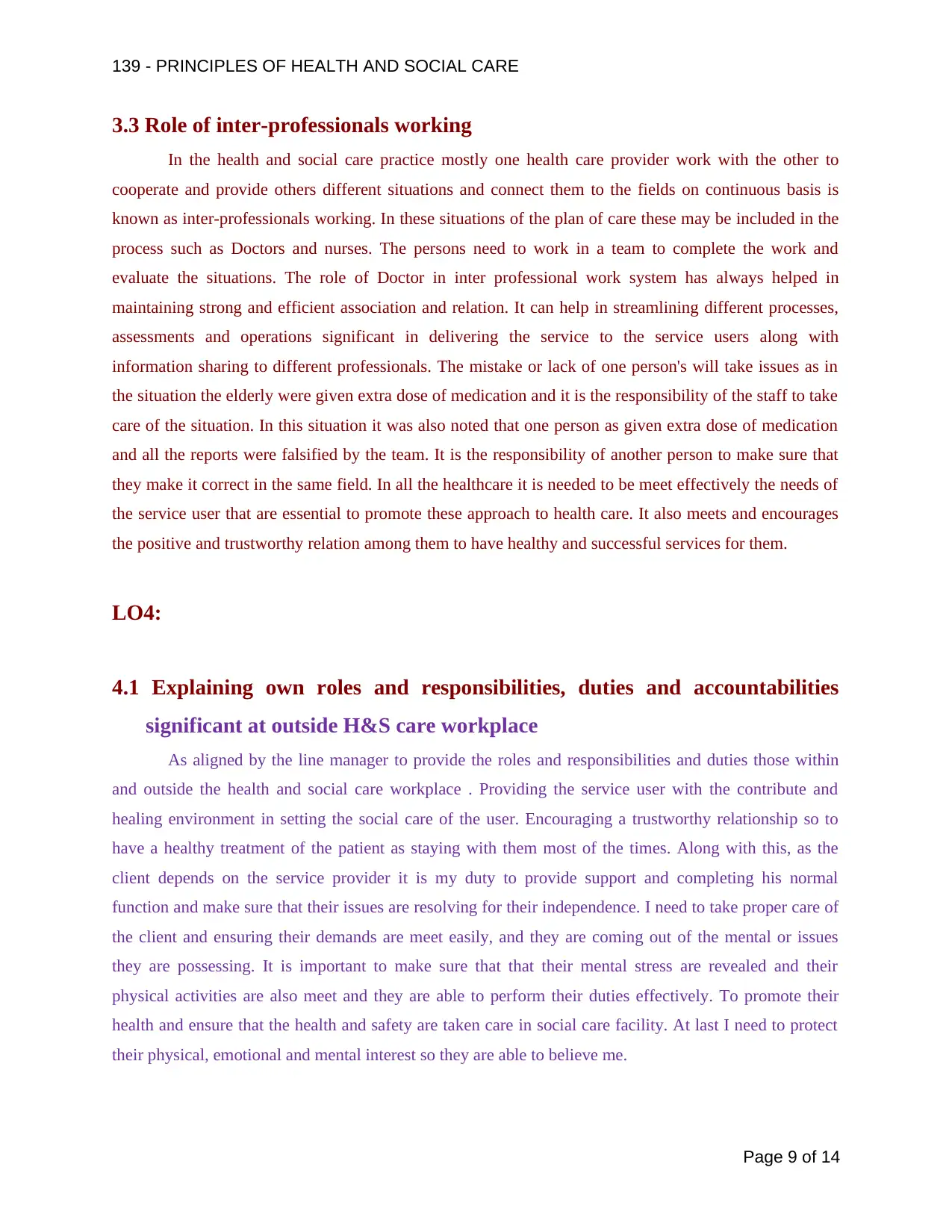
139 - PRINCIPLES OF HEALTH AND SOCIAL CARE
3.3 Role of inter-professionals working
In the health and social care practice mostly one health care provider work with the other to
cooperate and provide others different situations and connect them to the fields on continuous basis is
known as inter-professionals working. In these situations of the plan of care these may be included in the
process such as Doctors and nurses. The persons need to work in a team to complete the work and
evaluate the situations. The role of Doctor in inter professional work system has always helped in
maintaining strong and efficient association and relation. It can help in streamlining different processes,
assessments and operations significant in delivering the service to the service users along with
information sharing to different professionals. The mistake or lack of one person's will take issues as in
the situation the elderly were given extra dose of medication and it is the responsibility of the staff to take
care of the situation. In this situation it was also noted that one person as given extra dose of medication
and all the reports were falsified by the team. It is the responsibility of another person to make sure that
they make it correct in the same field. In all the healthcare it is needed to be meet effectively the needs of
the service user that are essential to promote these approach to health care. It also meets and encourages
the positive and trustworthy relation among them to have healthy and successful services for them.
LO4:
4.1 Explaining own roles and responsibilities, duties and accountabilities
significant at outside H&S care workplace
As aligned by the line manager to provide the roles and responsibilities and duties those within
and outside the health and social care workplace . Providing the service user with the contribute and
healing environment in setting the social care of the user. Encouraging a trustworthy relationship so to
have a healthy treatment of the patient as staying with them most of the times. Along with this, as the
client depends on the service provider it is my duty to provide support and completing his normal
function and make sure that their issues are resolving for their independence. I need to take proper care of
the client and ensuring their demands are meet easily, and they are coming out of the mental or issues
they are possessing. It is important to make sure that that their mental stress are revealed and their
physical activities are also meet and they are able to perform their duties effectively. To promote their
health and ensure that the health and safety are taken care in social care facility. At last I need to protect
their physical, emotional and mental interest so they are able to believe me.
Page 9 of 14
3.3 Role of inter-professionals working
In the health and social care practice mostly one health care provider work with the other to
cooperate and provide others different situations and connect them to the fields on continuous basis is
known as inter-professionals working. In these situations of the plan of care these may be included in the
process such as Doctors and nurses. The persons need to work in a team to complete the work and
evaluate the situations. The role of Doctor in inter professional work system has always helped in
maintaining strong and efficient association and relation. It can help in streamlining different processes,
assessments and operations significant in delivering the service to the service users along with
information sharing to different professionals. The mistake or lack of one person's will take issues as in
the situation the elderly were given extra dose of medication and it is the responsibility of the staff to take
care of the situation. In this situation it was also noted that one person as given extra dose of medication
and all the reports were falsified by the team. It is the responsibility of another person to make sure that
they make it correct in the same field. In all the healthcare it is needed to be meet effectively the needs of
the service user that are essential to promote these approach to health care. It also meets and encourages
the positive and trustworthy relation among them to have healthy and successful services for them.
LO4:
4.1 Explaining own roles and responsibilities, duties and accountabilities
significant at outside H&S care workplace
As aligned by the line manager to provide the roles and responsibilities and duties those within
and outside the health and social care workplace . Providing the service user with the contribute and
healing environment in setting the social care of the user. Encouraging a trustworthy relationship so to
have a healthy treatment of the patient as staying with them most of the times. Along with this, as the
client depends on the service provider it is my duty to provide support and completing his normal
function and make sure that their issues are resolving for their independence. I need to take proper care of
the client and ensuring their demands are meet easily, and they are coming out of the mental or issues
they are possessing. It is important to make sure that that their mental stress are revealed and their
physical activities are also meet and they are able to perform their duties effectively. To promote their
health and ensure that the health and safety are taken care in social care facility. At last I need to protect
their physical, emotional and mental interest so they are able to believe me.
Page 9 of 14
⊘ This is a preview!⊘
Do you want full access?
Subscribe today to unlock all pages.

Trusted by 1+ million students worldwide
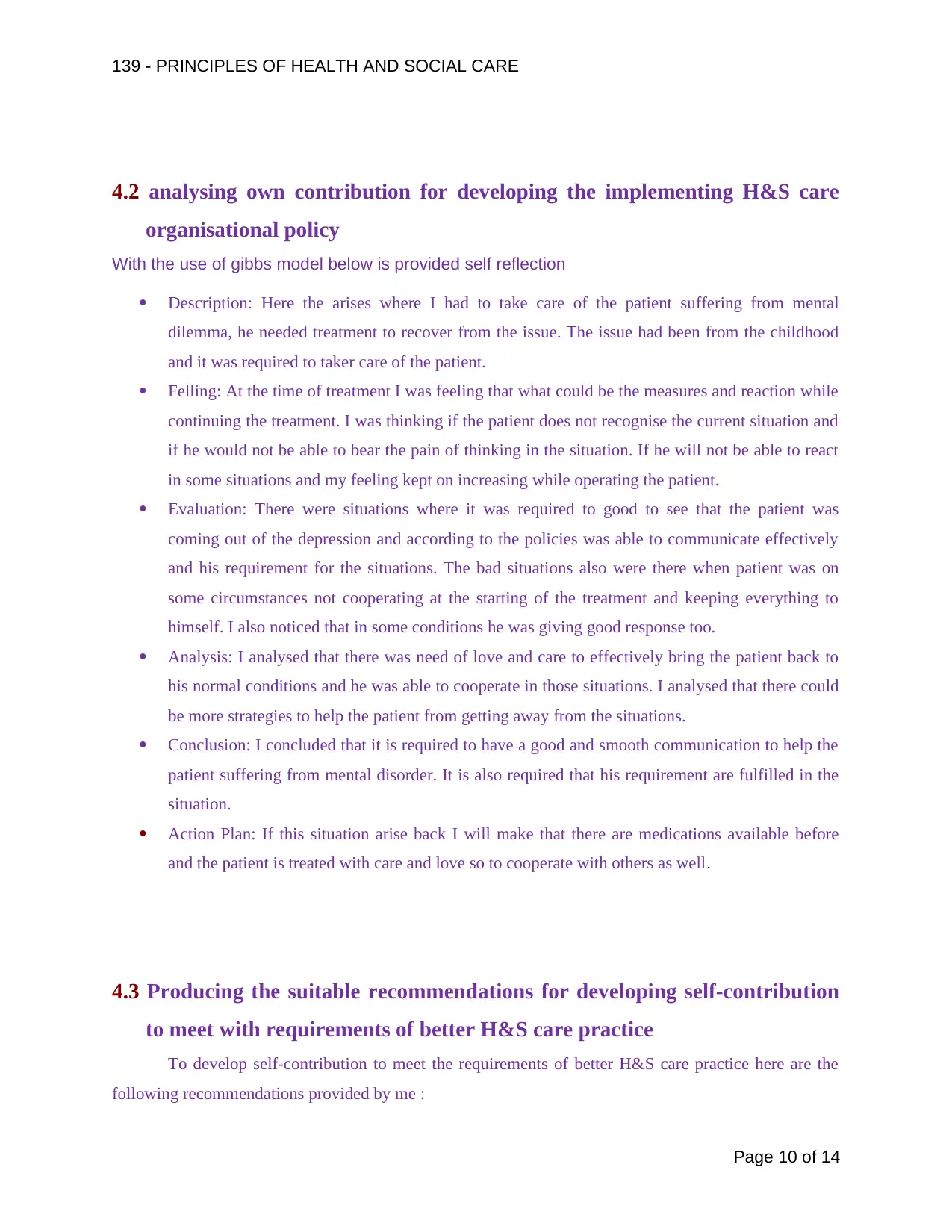
139 - PRINCIPLES OF HEALTH AND SOCIAL CARE
4.2 analysing own contribution for developing the implementing H&S care
organisational policy
With the use of gibbs model below is provided self reflection
Description: Here the arises where I had to take care of the patient suffering from mental
dilemma, he needed treatment to recover from the issue. The issue had been from the childhood
and it was required to taker care of the patient.
Felling: At the time of treatment I was feeling that what could be the measures and reaction while
continuing the treatment. I was thinking if the patient does not recognise the current situation and
if he would not be able to bear the pain of thinking in the situation. If he will not be able to react
in some situations and my feeling kept on increasing while operating the patient.
Evaluation: There were situations where it was required to good to see that the patient was
coming out of the depression and according to the policies was able to communicate effectively
and his requirement for the situations. The bad situations also were there when patient was on
some circumstances not cooperating at the starting of the treatment and keeping everything to
himself. I also noticed that in some conditions he was giving good response too.
Analysis: I analysed that there was need of love and care to effectively bring the patient back to
his normal conditions and he was able to cooperate in those situations. I analysed that there could
be more strategies to help the patient from getting away from the situations.
Conclusion: I concluded that it is required to have a good and smooth communication to help the
patient suffering from mental disorder. It is also required that his requirement are fulfilled in the
situation.
Action Plan: If this situation arise back I will make that there are medications available before
and the patient is treated with care and love so to cooperate with others as well.
4.3 Producing the suitable recommendations for developing self-contribution
to meet with requirements of better H&S care practice
To develop self-contribution to meet the requirements of better H&S care practice here are the
following recommendations provided by me :
Page 10 of 14
4.2 analysing own contribution for developing the implementing H&S care
organisational policy
With the use of gibbs model below is provided self reflection
Description: Here the arises where I had to take care of the patient suffering from mental
dilemma, he needed treatment to recover from the issue. The issue had been from the childhood
and it was required to taker care of the patient.
Felling: At the time of treatment I was feeling that what could be the measures and reaction while
continuing the treatment. I was thinking if the patient does not recognise the current situation and
if he would not be able to bear the pain of thinking in the situation. If he will not be able to react
in some situations and my feeling kept on increasing while operating the patient.
Evaluation: There were situations where it was required to good to see that the patient was
coming out of the depression and according to the policies was able to communicate effectively
and his requirement for the situations. The bad situations also were there when patient was on
some circumstances not cooperating at the starting of the treatment and keeping everything to
himself. I also noticed that in some conditions he was giving good response too.
Analysis: I analysed that there was need of love and care to effectively bring the patient back to
his normal conditions and he was able to cooperate in those situations. I analysed that there could
be more strategies to help the patient from getting away from the situations.
Conclusion: I concluded that it is required to have a good and smooth communication to help the
patient suffering from mental disorder. It is also required that his requirement are fulfilled in the
situation.
Action Plan: If this situation arise back I will make that there are medications available before
and the patient is treated with care and love so to cooperate with others as well.
4.3 Producing the suitable recommendations for developing self-contribution
to meet with requirements of better H&S care practice
To develop self-contribution to meet the requirements of better H&S care practice here are the
following recommendations provided by me :
Page 10 of 14
Paraphrase This Document
Need a fresh take? Get an instant paraphrase of this document with our AI Paraphraser
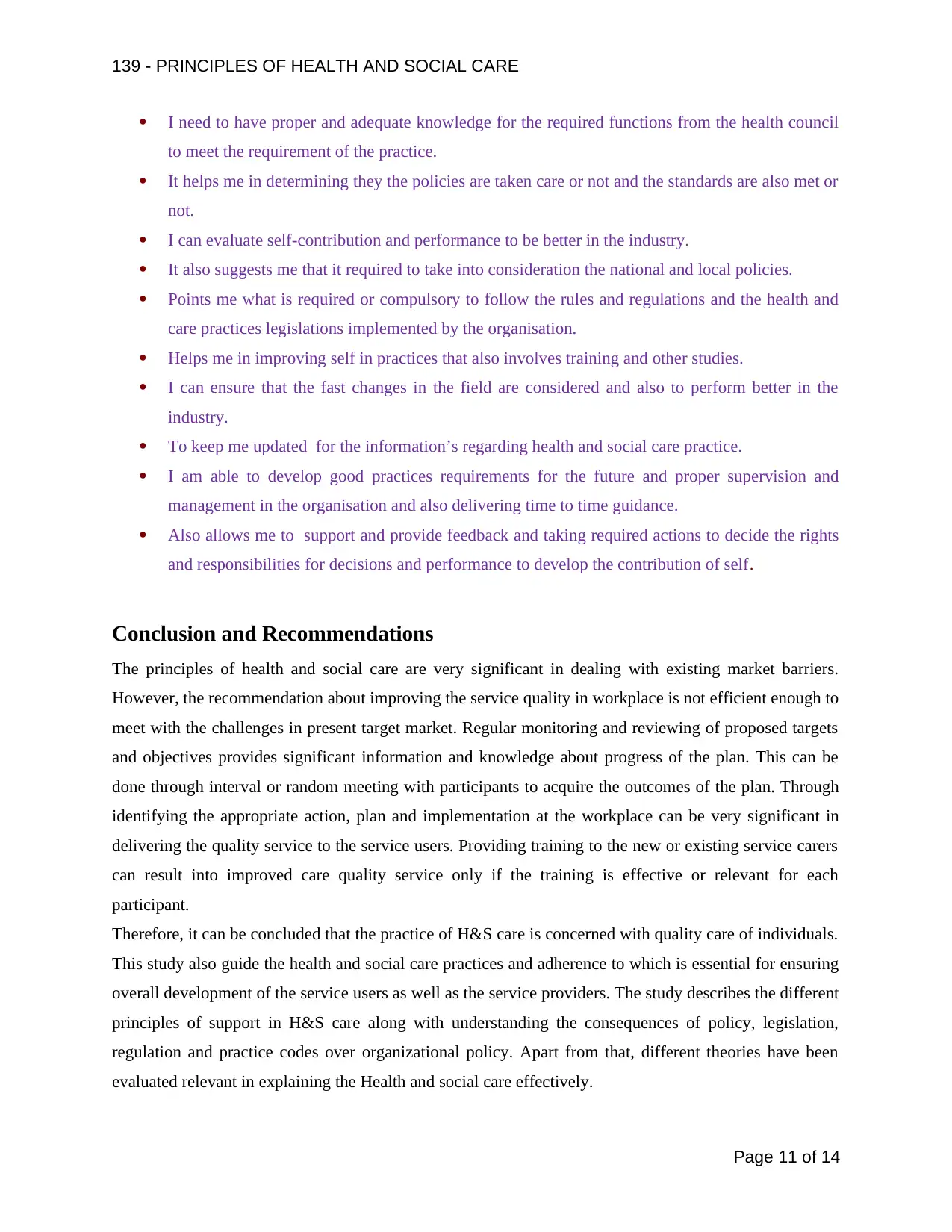
139 - PRINCIPLES OF HEALTH AND SOCIAL CARE
I need to have proper and adequate knowledge for the required functions from the health council
to meet the requirement of the practice.
It helps me in determining they the policies are taken care or not and the standards are also met or
not.
I can evaluate self-contribution and performance to be better in the industry.
It also suggests me that it required to take into consideration the national and local policies.
Points me what is required or compulsory to follow the rules and regulations and the health and
care practices legislations implemented by the organisation.
Helps me in improving self in practices that also involves training and other studies.
I can ensure that the fast changes in the field are considered and also to perform better in the
industry.
To keep me updated for the information’s regarding health and social care practice.
I am able to develop good practices requirements for the future and proper supervision and
management in the organisation and also delivering time to time guidance.
Also allows me to support and provide feedback and taking required actions to decide the rights
and responsibilities for decisions and performance to develop the contribution of self.
Conclusion and Recommendations
The principles of health and social care are very significant in dealing with existing market barriers.
However, the recommendation about improving the service quality in workplace is not efficient enough to
meet with the challenges in present target market. Regular monitoring and reviewing of proposed targets
and objectives provides significant information and knowledge about progress of the plan. This can be
done through interval or random meeting with participants to acquire the outcomes of the plan. Through
identifying the appropriate action, plan and implementation at the workplace can be very significant in
delivering the quality service to the service users. Providing training to the new or existing service carers
can result into improved care quality service only if the training is effective or relevant for each
participant.
Therefore, it can be concluded that the practice of H&S care is concerned with quality care of individuals.
This study also guide the health and social care practices and adherence to which is essential for ensuring
overall development of the service users as well as the service providers. The study describes the different
principles of support in H&S care along with understanding the consequences of policy, legislation,
regulation and practice codes over organizational policy. Apart from that, different theories have been
evaluated relevant in explaining the Health and social care effectively.
Page 11 of 14
I need to have proper and adequate knowledge for the required functions from the health council
to meet the requirement of the practice.
It helps me in determining they the policies are taken care or not and the standards are also met or
not.
I can evaluate self-contribution and performance to be better in the industry.
It also suggests me that it required to take into consideration the national and local policies.
Points me what is required or compulsory to follow the rules and regulations and the health and
care practices legislations implemented by the organisation.
Helps me in improving self in practices that also involves training and other studies.
I can ensure that the fast changes in the field are considered and also to perform better in the
industry.
To keep me updated for the information’s regarding health and social care practice.
I am able to develop good practices requirements for the future and proper supervision and
management in the organisation and also delivering time to time guidance.
Also allows me to support and provide feedback and taking required actions to decide the rights
and responsibilities for decisions and performance to develop the contribution of self.
Conclusion and Recommendations
The principles of health and social care are very significant in dealing with existing market barriers.
However, the recommendation about improving the service quality in workplace is not efficient enough to
meet with the challenges in present target market. Regular monitoring and reviewing of proposed targets
and objectives provides significant information and knowledge about progress of the plan. This can be
done through interval or random meeting with participants to acquire the outcomes of the plan. Through
identifying the appropriate action, plan and implementation at the workplace can be very significant in
delivering the quality service to the service users. Providing training to the new or existing service carers
can result into improved care quality service only if the training is effective or relevant for each
participant.
Therefore, it can be concluded that the practice of H&S care is concerned with quality care of individuals.
This study also guide the health and social care practices and adherence to which is essential for ensuring
overall development of the service users as well as the service providers. The study describes the different
principles of support in H&S care along with understanding the consequences of policy, legislation,
regulation and practice codes over organizational policy. Apart from that, different theories have been
evaluated relevant in explaining the Health and social care effectively.
Page 11 of 14
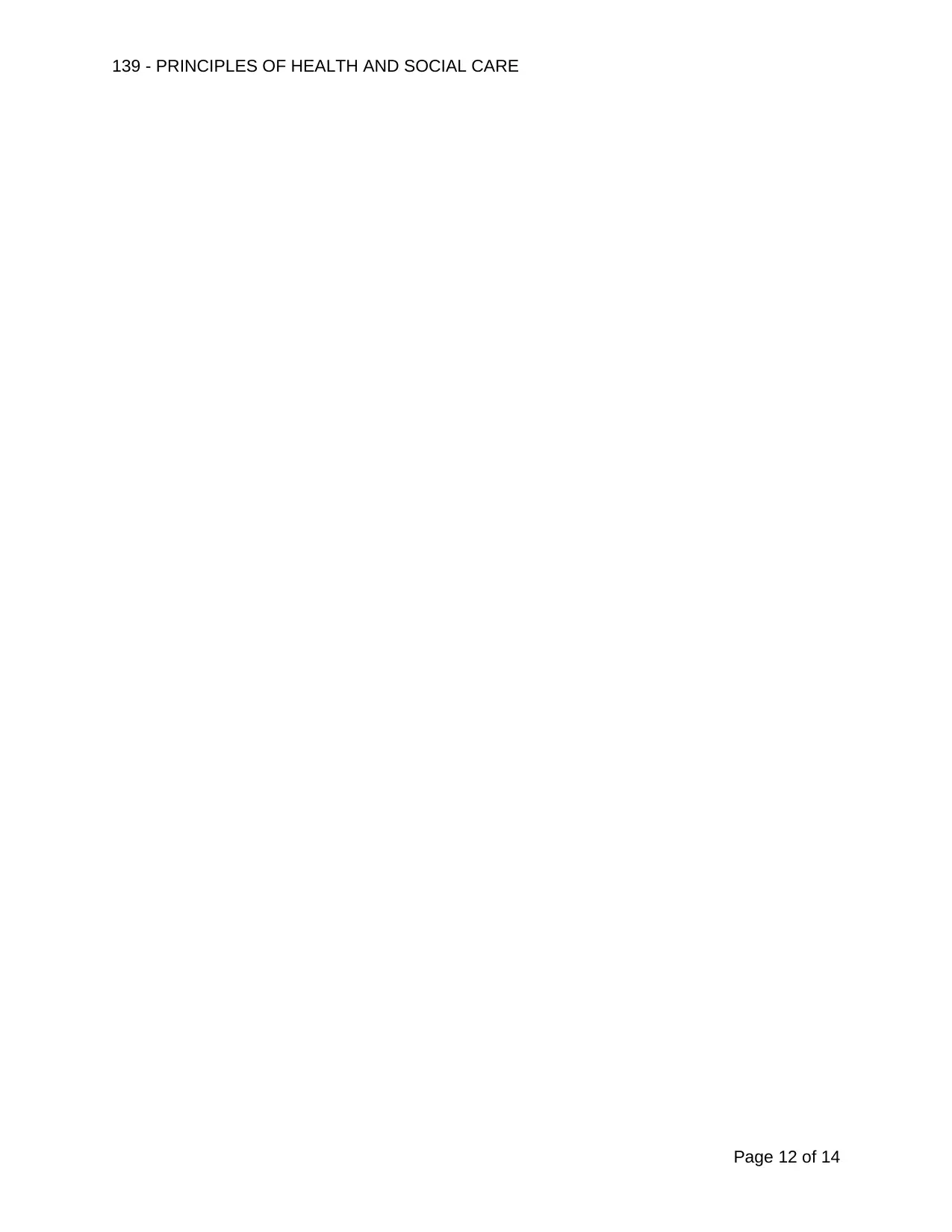
139 - PRINCIPLES OF HEALTH AND SOCIAL CARE
Page 12 of 14
Page 12 of 14
⊘ This is a preview!⊘
Do you want full access?
Subscribe today to unlock all pages.

Trusted by 1+ million students worldwide
1 out of 14
Related Documents
Your All-in-One AI-Powered Toolkit for Academic Success.
+13062052269
info@desklib.com
Available 24*7 on WhatsApp / Email
![[object Object]](/_next/static/media/star-bottom.7253800d.svg)
Unlock your academic potential
Copyright © 2020–2026 A2Z Services. All Rights Reserved. Developed and managed by ZUCOL.





